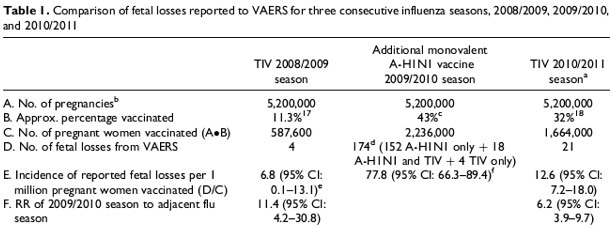October 14, 2012
by Heidi Stevenson
A study documents that the first swine flu season resulted in 6 to 11 times more fetal deaths from the second flu vaccine given to their mothers, and explains why the additional dose of mercury is the likely culprit.

A recent study documents that the swine flu (H1N1) vaccine that was added to the US schedule in 2009-2010 resulted in 6-11 times the vaccine-related miscarriages of either the previous or following year. The study’s author strongly suggests that the preservative thimerosol is the likely culprit.
Study’s Author
The study, Comparison of VAERS fetal-loss reports during three consecutive influenza seasons: Was there a synergistic fetal toxicity associated with the two-vaccine 2009/2010 season? was published in the journal Human & Experimental Toxicology. The author, Gary S. Goldman, Ph.D. has acted as a reviewer for several journals, including Journal of the American Medical Association (JAMA) and Vaccine. He has previously been published in JAMA, The Journal of American Physicians and Surgeons, Pediatrics, The International Journal of Toxicology, and Vaccine.
The Study
The author uses both the Vaccine Adverse Event Reporting System (VAERS) data base and an independent survey conducted by the National Coalition of Organized Women (NCOW). A statistical analysis was done to extrapolate the likely number of miscarriages that occurred after the swine flu vaccination across the nation. Goldman states:
[T]he 174 VAERS fetal loss case reports represent 13.2% (174/1321) of the total estimated fetal loss reports in the US population.
That means there were about 590 miscarriages as a result of flu vaccines in 2009/10.
The reported number of fetal loss reports in the previous year, 2008-09, was 4, for a more likely total of 30 if one takes the 13.2% actual rate into account. The number reported in the following year, 2010-11, was 21, or 159 actual miscarriages.
The VAERS results, as reported in a table by Goldman, are:

TIV = trivalent influenza vaccine
After all the statistical analyses were done, these figures were translated to the number of reported fetal losses per one million pregnancies. Those results were 6.8/million in 2008-09 when a single trivalent vaccine was given, 12.6/million in 2010/11 when a single trivalent was given, and 77.8 in 2009/10 when both a trivalent and H1N1 (swine flu) vaccine was added to the mix. (Note, though, that if only 13.2% of the total miscarriages are being reported, then the actual figures are much higher.)
The addition of the swine flu vaccine resulted in an increase of 6 times as many miscarriages compared to the following year and 11 times as many compared to the previous year!
Thimerosal/Mercury: The Likely Cause
Most of the trivalent flu vaccines included mercury-containing thimerosal and the 2009/10 swine flu vaccine included it. Goldman reviews studies and information that discuss an association between mercury injections into the mother and her fetus, and the linkage between thimerosal and autism spectrum disorders. He points out:
Radioactive mercury injected into pregnant rabbits can be shown to settle and stay in fetal organs, including the brain, liver, and kidneys.
Children with autistic spectrum disorders “have higher levels of mercury body burden than typically developing children”.
Genetic variants can result in varying degrees of toxicity from mercury.
The Environmental Protection Agency (EPA) has established that the safe level of mercury obtained through ingestion is unrelated to mercury from injection, because mercury injection “delivers more of the toxic dose of mercury administered into the body.”
Mercury has been found to be toxic at very low levels. In vitro testing of 0.87 micrograms/kilogram of mercury introduced to human neuroblastoma cells resulted in over 50% of the cells dying.
Therefore, he states:
[I}t is biologically plausible that during the two-vaccine 2009/2010 influenza season, when pregnant women were administered two Thimerosal-containing influenza vaccines each delivering 50 mcg of Thimerosal (or 25 mcg of mercury per dose), the fetus’ mercury dose exceeded the EPAs reference dose (0.1 mcg of mercury/kg/day).
It is likely that the addition of another 0.5 micrograms of mercury from the swine flu vaccine shortly after a 0.5 microgram dose from the regular trivalent flu vaccine, resulting in a total dose of 1.0 micrograms of mercury—greater than the amount found to kill more than half the neuroblastoma cells in a study and ten time greater than the EPA’s establishment of a toxic dose in a single day—is what caused such a significant increase in fetal mortality in women who were subjected to the stand-alone swine flu vaccine during the 2009/10 flu season.
The Fetuses That Survived the Second Flu Vaccine
Goldman concludes:
In addition, because of the order of magnitude increase in fetal-loss report rates, from 6.8 fetal-loss reports per million pregnant women vaccinated in the single-dose 2008/2009 season to 77.8 in the two-dose 2009/2010 season, further long-term studies are needed to assess adverse outcomes in the surviving children.
What of all the fetuses that survived the second mercury-laced flu vaccine given to their mothers? It appears clear that it resulted in the loss of a significant number of babies. What harm has been done to the survivors? Will the babies born to these mothers develop normally? Surely, they should be followed to see if their development is normal.
These children have become guinea pigs in an experiment, though the perpetrators are not interested in following up to see what damage their handiwork has produced. Isn’t it time that real science stepped in to stop the carnage?
Sources:
Comparison of VAERS fetal-loss reports during three consecutive influenza seasons: Was there a synergistic fetal toxicity associated with the two-vaccine 2009/2010 season? Gary S. Goldman, doi:10.1177/0960327112455067, Hum Exp Toxicol September 27, 20120960327112455067






Leave a comment